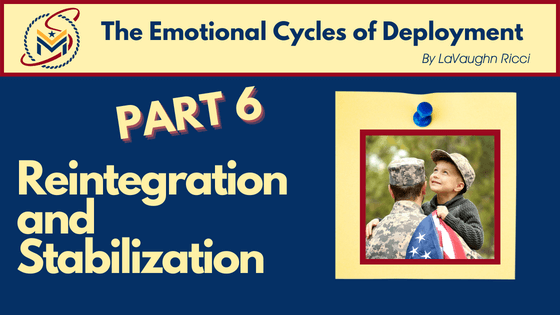*Join Blogger LaVaughn Ricci as she chronicles the emotional cycles of deployment. This is Part Six. Click these links to go back to Part 1, Part 2, Part 3, Part 4, and Part 5.
Part Six, Deployment: Reintegration and Stabilization
Finally, my husband’s deployment had come to an end. We went through a whirlwind of enjoying him while he was on leave, to losing him again to a month-long TDY, to then being thrown into a PCS.
Due to these constant transitions and our inability to immediately go back to a normal routine, it took us a bit of time to process the final stage of the emotional cycle of deployment.
I’ve spent the past few months reflecting on my family’s experience going through the emotional cycle of deployment.
We have endured the pre-deployment stages of anticipation of departure and detachment and withdrawal. We then moved to the deployment stages of emotional disorganization, recovery and stabilization, and anticipation of return.
We finally reached the post-deployment stage of return adjustment and renegotiation, and now here we were at the last stage of reintegration and stabilization.
Once we settled post-PCS, I found it just a little bit challenging to let my husband back into our new norm we had developed while he was away.
The children and I had been on a roll, we had been efficient, and I had actually enjoyed our flexible, independent lives!
Though he was happy to be back with us, I could tell my husband was missing things like the level of structure he had overseas, and the intellectual conversations he had over meals with his adult teammates. I understood it was probably difficult coming back to a chaotic house full of children where he had to remain ever-patient and flexible.
My husband and I had become different people while he was away, and I think we were proud of what we had each endured to become stronger individuals.
It took some time to reestablish our roles and determine how they might work together now. Maybe it actually helped this reintegration period that we had just PCS’d and we could start fresh in a new home, a new area. It sure was a lot of changes at once, though.
As with every PCS, it takes many months to feel settled. I think because we had to restabilize as a couple and restabilize because of a PCS, we stretched this stage of the emotional cycle of deployment quite far.
I was frustrated often by the way my husband did things.
 He was trying to be helpful, but it wasn’t always accommodating. He seemed to have forgotten our children’s bedtime routine, so instead of helping them change into their pajamas, he’d let them stay up late and read books or watch silly videos with him.
He was trying to be helpful, but it wasn’t always accommodating. He seemed to have forgotten our children’s bedtime routine, so instead of helping them change into their pajamas, he’d let them stay up late and read books or watch silly videos with him.
He still couldn’t remember how to complete kitchen work correctly, so if I asked him to help with the dishes, he would put the wrong items in the dishwasher.
He couldn’t seem to comply with our color-coded system, so he gave the children the wrong colored dishes, and the wrong colored school supplies, and confused all of us. I’d have to remind myself that at least my husband was home safe and he cared enough to try.
I’ve had to relax on the routines at times and simply sit back and be grateful. I’m sure my husband had a whole list of things about me that frustrated him too!
Recognizing these things, discussing them with each other, and remaining patient in the challenging moments has kept us close.
The timeline for reintegration is different for everyone.
It’s easy to become bitter, especially when this period stretches so long. I encourage you to persevere, keep an open line of communication, reevaluate your love languages, and be intentional about carving out time for each other (a date night in having dinner and enjoying a movie together while the children are sleeping is a great place to start)!
I’m confident you will soon reach that point of stabilization!
As I look back and process all one goes through during their spouse’s deployment, it’s quite a lot. I don’t think I even fully knew what I was going through as a spouse!
I simply jumped into action and fought every day to stay sane, keep the children alive, keep the house standing, and maintain the best relationship I could with my husband while he was thousands of miles away.
Sometimes, it’s just that way. But I have also since processed it, so I want to leave you with this:
 I encourage you to be intentional about making time for YOU, too.
I encourage you to be intentional about making time for YOU, too.
Use that family separation pay to hire a sitter for the children on a regular basis (or request your spouse watch the children if he/she is now home), so you can sit in a quiet coffee shop alone to process, or meet with a friend to seek encouragement.
There’s no doubt about it, deployments are hard! But you can do this! There is always a way! Fight for your family!
*This is the final part of my blog series covering the emotional cycle of deployment. Please read below for more guidance.
Dear Reader, are you feeling the same? I want you to know these are perfectly normal stages and feelings of deployment – and they are temporary! You are not alone, and you will overcome these challenges. Please seek help if needed. Talk to a friend, a chaplain or pastor, and try these websites to discover a plethora of information on deployment resources, help for military children, freebies for children of deployed parents, special events near you, and more!
Military and Family Life Counseling (MFLC)
United Service Organizations (USO)
Editor’s Note: We can’t thank LaVaughn enough for putting this series together. This information is an essential resource to be read and shared. Please share the series with anyone facing (or experiencing) a deployment.








0 Comments